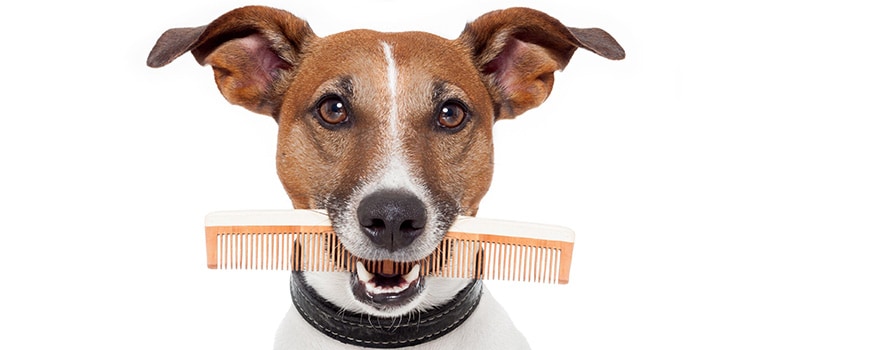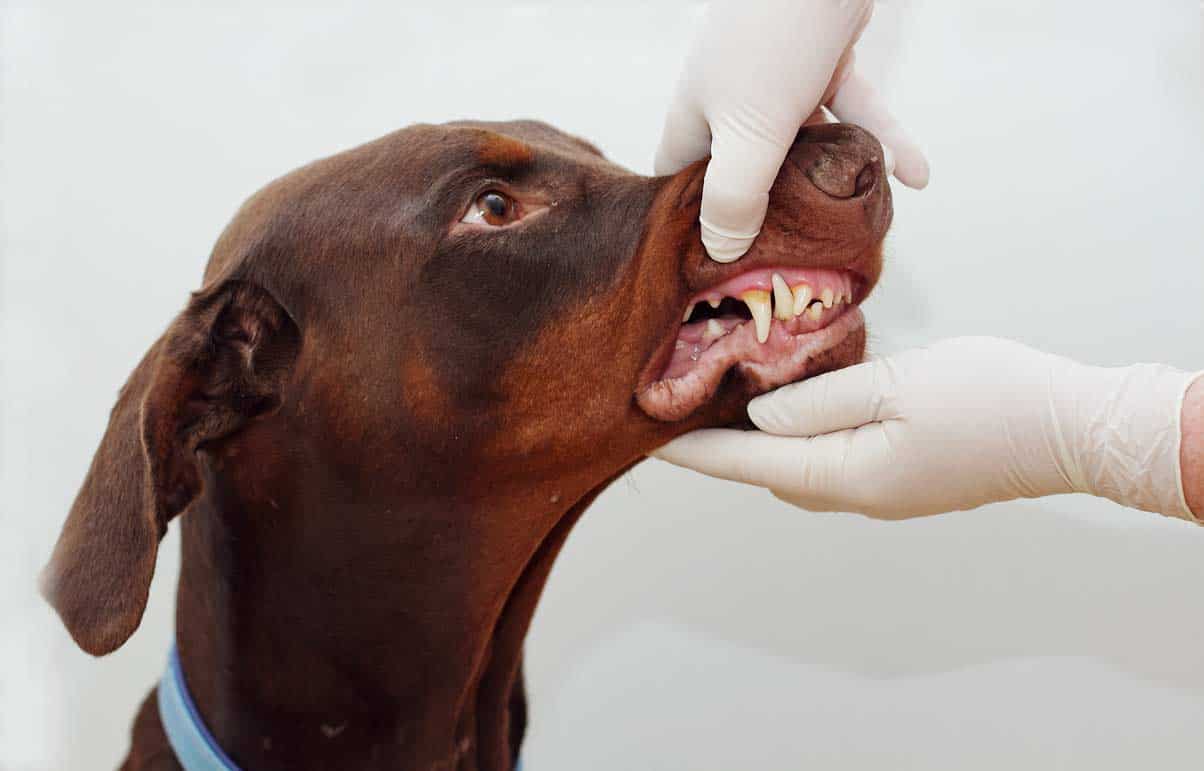About 80 percent of dogs show some signs of dental disease by the age of three years. It’s no wonder dental care for dogs has become such a vital part of maintenance care. With dogs living longer than ever, it’s important to invest the effort necessary to keep your Dobermans teeth healthy and in his mouth as long as possible.
Wild species of canine enjoy the benefits of natural teeth cleaning from the foods they eat. The fibrous tissues and bones of prey help scrape and remove any food residue that accumulates. Domesticated dogs, on the other hand, consume foods that stick to the teeth and develop into plaque and tartar.
Moist or wet foods are notorious for leaving residue, and dry foods crack and crumble before they can scrape and clean the portion of the teeth along the gum line. The accumulation of plaque and tartar eventually works its way under the gums, where bacteria begin to thrive and multiply. The bacteria may cause infections in the mouth that can subsequently travel throughout the circulatory system to infect other parts of the body. A dog with serious periodontal disease can become very sick indeed.
Choosing Dental Care Products
Because we have taken dogs out of their wild environment and subjected them to commercial foods that cause this problem, we need take steps to compensate for the dental care otherwise provided by Mother Nature. Many products are on the market to help with this job, including dental chews and bones like the ones made by Nylabone. But while dental chews and bones help remove food particles from the teeth, brushing helps to further remove plaque buildup along the gum line.
Tooth brushing kits come with either finger applicators or brushes, and you can choose whichever is most comfortable for your dog and is easiest for you to use. Doggy toothpastes are specially formulated and have a pleasant taste that will ensure your dog’s cooperation.
How to Brush Your Dog’s Teeth
When you are ready to incorporate dental care into your grooming routine, introduce your Doberman to this process gradually. First, let him taste some of the toothpaste to spark his interest, and then brush only his front teeth. Each time you brush, work a few more teeth into your dental regimen until you can eventually brush all his teeth without protest.
Most dogs, both young and old, will adjust quite well to this routine, and you will soon be able to check and clean your dog’s teeth with little time or effort.
Brushing once or twice a week is the best way to prevent dental problems, but brushing is just a preventive and not a cure. If your dog already exhibits signs of dental disease, consult your veterinarian. He may recommend a professional teeth cleaning in which he will remove the accumulation of plaque and tartar while your dog is under anesthesia. Regular brushing afterward will help keep your dog’s teeth in good condition.
If you look at grooming as an opportunity to enjoy and spend time with your dog, all the other benefits that come from it are icing on the cake. Your dog will look and feel good, and this will reflect in his attitude. You, too, will find it hard not to be proud of his appearance. In addition to being twice as huggable, a clean dog will leave less hair and dander in your home. Best yet, regular grooming helps keep your Doberman healthy, something worth more than money.
Banishing Bad Breath
When your guests shirk away from your Doberman’s friendly kisses, it is a good indication that your canine companion suffers from the most despicable of doggy odors—dog breath. Some cases of bad breath are, caused by bacteria in the mouth and are a sign of poor dental care. To minimize odor, keep your dog’s teeth brushed, or schedule a professional cleaning with your veterinarian if his dental condition requires it.
Even with the best dental care, some dogs can still melt steel with a pant of their breath. Bad breath isn’t always a sign of dental disease, however, but rather of what your dog eats. Horses have pleasantly sweet breath because they eat fresh grass and fragrant alfalfa. Dogs have “dog breath” because they eat meat. Teeth brushing may not always address this problem because canine toothpastes are designed to taste good to dogs, not necessarily to smell good to humans.
But all is not lost. You can still combat dog breath – with some of the new, innovative dental products now on the market, such as the ones made by Nylabone. Breath strips or wipes can help sweeten your dog’s breath; dental wipes that contain baking soda are especially effective. With regular care, perhaps the day will come when “dog breath” will no longer be a derogatory term.

